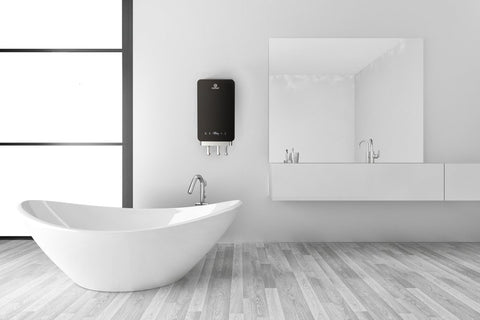
Choosing a tankless water heater over a traditional hot water tank is not a difficult decision when you consider the benefits of going tankless, which include energy savings of up to 30%, freed-up floor space, a longer lifespan, and never running out of hot water. However, tankless heaters, unlike traditional hot water tanks, come in a variety of sizes, functions, and capacities, which can make it difficult to choose the right one for your needs.
Before considering the factors that should be taken into account when choosing a tankless unit, it would be helpful to list the types of tankless heaters available on the market today and their particular characteristics:
- Outdoor gas tankless water heaters: used for outdoor applications such as campgrounds, cabins, RVs, boats, etc. Since portable units are only for outdoor use, no venting is required. The fuel source is portable propane gas canisters.
- Indoor gas tankless water heaters: used for indoor applications such as homes, apartments, businesses, etc. Since the fuel source is gas, either propane or natural, these units require ventilation.
- Indoor electric tankless water heaters: used for indoor applications such as homes and business. Since the fuel source is electricity, no venting is required.
- Point of use tankless water heaters: smaller units that deliver instant hot water to a specific location such as an individual kitchen sink or a shower. Since the fuel source is electricity, no venting is required.
The first and most important factor to consider when choosing a water heater for a home, business or recreational vehicle is how much hot water is needed at any time. This is determined by the number of fixtures you have (sinks, showers, appliances, etc.) and how many gallons per minute (GPM) of water is consumed by each fixture when running. In addition, it is also important to consider how many appliances are typically run at one time. For example, if the dishwasher, clothes washer, and shower are often used at the same time, you might want to consider a unit with a flow rate that will provide enough water to run all applications simultaneously. However, if you rarely run more than a couple of appliances at one time, a smaller unit would be sufficient to cover your hot water needs.
The second factor to consider is the type of fuel source you will use to power your tankless water heater. Both electrical and gas sources have their advantages and disadvantages, but the main difference between them is the need for ventilation. If you opt for a gas-powered unit, you will need to have a venting mechanism installed. If you decide on an electrical unit, all you will need is a power hookup.
Finally, the last question to ask yourself when choosing a tankless water heater is how you will use it. For example, if you’d like to enjoy a hot shower at your off-grid cabin, a portable propane-powered unit will do the job nicely. If you’re looking to supplement your home’s existing hot water capacity, you can add a point of use heater that will provide unlimited hot water at a single fixture. For a small apartment with limited storage space, an electrical unit will meet your hot water needs while saving valuable floor space. Or, if you have a home with a gas source available, a large gas-powered unit will provide unlimited hot water to multiple fixtures while saving you money on your energy bills.
Once you’ve made your choice, you can start enjoying the best thing about tankless water heaters: never running out of hot water again!











